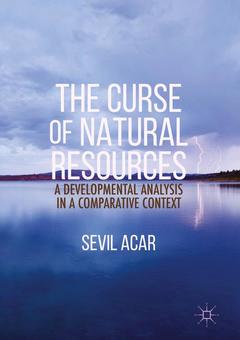Description
The Curse of Natural Resources, 1st ed. 2017
A Developmental Analysis in a Comparative Context
Author: Acar Sevil
Language: English
Subjects for The Curse of Natural Resources:
Keywords
Adjusted net saving; genuine saving; green accounting; human development; natural capital; sustainable development; intergenerational equity; welfare; norway; sweden; business; Economic Development; economic growth; environment; Export; macroeconomics; management; natural resources; sustainability management; natural resource extraction; sustainability
Approximative price 94.94 €
In Print (Delivery period: 15 days).
Add to cartPublication date: 01-2019
Support: Print on demand
Publication date: 02-2017
Support: Print on demand
Description
/li>Contents
/li>Biography
/li>Comment
/li>




